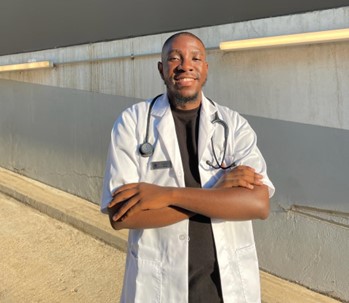Ikaneng Yingwane, student ambassador at Sefako Makgatho Health Sciences, recounts his emotional journey as a fourth year medical student.
______
Medical school is more than just learning about the human body and illnesses. It's a journey filled with emotions that can be as challenging as the exams and clinical work. As a 4th year medical student, I've felt the highs and lows of this emotional rollercoaster. Let me share some insights into this journey.
One of the most exciting moments for many medical students is stepping into the anatomy lab for the first time. It's a mix of awe and anticipation. Holding a scalpel, looking at the human body up close, and understanding its intricacies can be both thrilling and humbling. These moments remind us why we chose this path, igniting a passion for medicine that drives us forward.
There are also moments of triumph when we ace an exam or receive positive feedback during clinical rotations. These highs reinforce our confidence and remind us that hard work does pay off. Celebrating these small victories with classmates often creates bonds that last a lifetime.
However, medical school isn't all highs. There are times when the workload feels overwhelming, and self-doubt creeps in. Questions like "Am I good enough?" or "Can I really do this?" become all too familiar. It's natural to feel this way, especially when faced with the immense responsibility of caring for patients' lives.
Clinical rotations can also be emotionally challenging. Witnessing patients in pain or dealing with difficult diagnoses can take a toll on our emotions. Learning to balance empathy with professional detachment is a skill we develop over time, but it's not always easy.
So, how do we navigate these emotional highs and lows? One of the most important things is to find healthy ways to cope. This could be through talking to friends, family, or mentors about our feelings. Sometimes, just knowing that others are going through the same thing can be comforting.
Physical activity is another great way to manage stress. Whether it's going for a run, practising yoga, or simply taking a walk, exercise can help clear our minds and boost our mood.
Mindfulness and relaxation techniques, such as deep breathing or meditation, can also be beneficial. These practices help us stay present and focused, reducing anxiety and improving overall well-being.
Having a strong support system is crucial during medical school. This could be fellow students, faculty members, or even online communities of medical professionals. These are the people who understand the challenges we face and can offer guidance, encouragement, and sometimes just a listening ear.
Lastly, it's essential to prioritise mental health. Recognising when we're feeling overwhelmed and seeking help when needed is not a sign of weakness but of strength. Many medical schools offer counselling services or mental health resources to support students. Taking advantage of these resources can make a world of difference in our well-being and academic performance.
The emotional journey of medical school is filled with highs and lows, moments of self-doubt, and triumphs. By finding healthy coping mechanisms, building strong support systems, and prioritising mental health awareness, we can navigate this journey more effectively. Remember, it's okay to ask for help and take care of ourselves along the way.

______
To read more student articles like this visit our student hub.